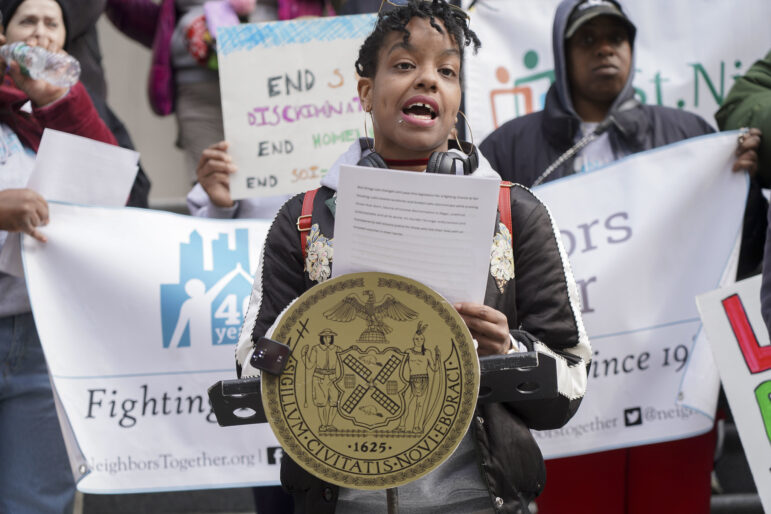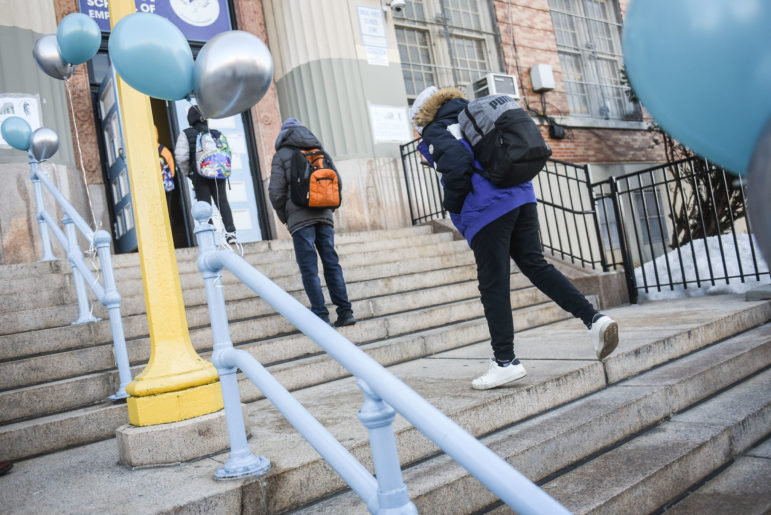As a sixth grader back in San Juan, Puerto Rico, Margarita López watched helplessly one afternoon as the school tough slugged a friend of hers in the chest. Incensed, she gathered together all the girls on the playground.
If this bully hits anyone else, she told them, we’re going to retaliate. She handed each a safety pin plucked from the patches on her jean jacket, and the troupe gathered around him, warning him never to hit a girl again.
Unfazed, the bully reeled back and punched another girl. So the group brought out their tiny safety pins and attacked the boy with pinpricks, sending him loping away in pain.
When the principal called her in, young Margarita respectfully acknowledged that she had indeed organized the reprisal. Then, to the man’s surprise, she calmly informed him that her group would respond the same way if the bully punched any other girls. Astounded but charmed, the principal issued a mild rebuke and excused her.
“I’m not sure if the pins were right,” the 47-year-old López says today. “I realize now that fighting fire with fire never works. You don’t utilize the same method of injustice to fight back. You have to be better and smarter.”
For López, now a New York City Councilwoman, that translates into leading 100 marchers to City Hall to protest the city’s sale of a popular community center. But it also means quietly lobbying City Council Speaker Peter Vallone for increased funding to a local girls club and supporting the conservative Queens Democrat in his bid to unseat Governor George Pataki.
This isn’t the script anyone would have written for the most unreconstructed leftist elected to the City Council in recent memory, a lesbian activist who made her reputation as a passionate community organizer. When López replaced Antonio Pagán, a Giuliani Democrat backed by landlords and developers, Lower East Siders expected a dramatic political change.
But as López has revealed more of the charm that served her well in the principal’s office, she has confounded the expectations of both enemies and supporters.
For one thing, she’s not afraid to make deals. “I will not hide from saying that I want power. We should take power,” she says. “I’m sick and tired of progressives thinking that by nature power is bad. If we use power to benefit all of us, then there is nothing wrong with it.”
Her politics alone–pro-tenant, anti-privatization, green–won’t necessarily alienate her from the council. “Council members who portrayed themselves as outsiders or progressives who did run afoul of the leadership had problems because of how they conducted themselves rather than what their agenda was,” says the well-connected Brooklyn Councilman Ken Fisher. “Margarita has not made that mistake.”
She has come to the City Council at an unusual time, when term limits and the struggle between Vallone and Giuliani have unbalanced the traditional city power structure. López, who made her career helping the disenfranchised, is now poised to become an influential insider. Not bad for someone who didn’t speak English until the age of 26.
_______
In 1979, after college and some organizing efforts in Puerto Rico, Margarita López came to New York looking for work. She finished up her college degree in sociology at City College despite her limited English and went on to do coursework towards an master’s degree in social work at Columbia University.
Her first job in New York was for the now-defunct Association for Community Services on East 4th Street, earning $50 a week as a social worker. In the late 1980s, she took the position she would keep until the day she joined the council–homeless outreach worker at Goddard-Riverside Community Center, an Upper West Side settlement house.
“Her passion was for direct service work with the homeless,” says Goddard-Riverside organizer Larry Wood. “There are legends about her work with particular clients. One woman, who nobody else would go near with a 10-foot pole–she was dirty and had lice–Margarita stripped down and took a shower with her, to get her de-loused so the ambulance could take her.”
All the while, López spent her spare time organizing and campaigning for tenants’ rights. She got involved in Lower East Side public housing battles and squatter struggles as a volunteer organizer, and, eventually, as a district leader. Her work naturally led to building coalitions and brokering deals.
“She has a terrific ability to navigate the different waters of this political environment,” says Valerio Orselli, director of the Cooper Square Mutual Housing Association. He credits for building a coalition that guaranteed the survival of his Lower East Side low-income housing complex. “Most of all she is persistent,” he adds.
López has also made enemies, sometimes in spectacular ways. At one anarchic meeting of the Lower East Side community board, notorious for political vaudeville, board chair Louis Soler had her and a few others arrested. López sued for false arrest; Soler settled. Councilman Pagán subsequently wrote to then-borough president Ruth Messinger, asking that López be removed from the board. She sued him for libel; the case has yet to be decided.
López has also gone after bigger game, notably Assembly Speaker Sheldon Silver, probably the state’s most powerful Democrat. Last year, in a hotly contested council race, she ran against Silver’s aide, Judy Rapfogel. That primary exposed a rift in the highly Democratic district between progressives and Silver’s Grand Street group, more conservative, wealthier whites known by their co-ops’ location.
“I think it’s fair to say that in the past [López] has been divisive,” says Howard Hemsley, Rapfogel’s campaign manager. Hemsley had locked horns with López for years on familiar Lower East Side struggles over land use, gentrification and housing. For example, López supported the 1988 squatter occupation of Tompkins Square park; Hemsley, among others, credits the city with ridding the park of drug-dealing and crime. He vows to work for anybody who might run against her in a second-term race.
Rapfogel had the cash, the best election lawyers, a seasoned campaign staff and overwhelming union support. López had only two significant endorsements: Congresswoman Nydia Velázquez, the first Puerto Rican woman ever elected to the U.S. House of Representatives, and Assemblywoman Deborah Glick, a West Side lesbian activist.
But Margarita López had one huge advantage. She had been working the district’s housing projects and community centers for over a decade. “Twenty years of activism gets you to shake hands with a lot of brothers and sisters,” she says. Unlike other politicians, she had been able to make common cause between rent-regulated tenants and public housing tenants threatened with privatization. “More sophisticated political people told us not to worry about the projects [along the East River],” says her campaign treasurer Lisa Kaplan. “‘Those people don’t vote,’ they said. That was not Margarita’s strategy, and that conventional wisdom was absolutely proven untrue.”
Initial election reports handed Rapfogel the victory. The next day, The New York Times reported that Rapfogel “narrowly edged out Margarita López.” But López wasn’t ready to concede. Some 750 “emergency ballots” had been issued to voters whose names hadn’t shown up on lists at polling sites, ballots that get counted only in a contested vote.
Calling on friends in the Latino Elected Officials Association and the Victory Fund, a national gay and lesbian political organization, López challenged the results. When the voting machines were opened at election headquarters the next day and the paper ballots were tallied, Margarita López emerged the winner, 6,471 to Rapfogel’s 6,240–a victory margin of just 231 votes.
_______
Given her activist past, her narrow victory and her ongoing war with the state’s top Democrat, no one seemed more doomed to marginalization in the council than López. But she was lucky enough to step into office just as term limits were turning normally mousy council members into political warriors.
Gubernatorial candidate Vallone began to flex the council’s muscle, fighting with the mayor over the budget and Yankee Stadium. The council budget, passed in defiance of Giuliani’s spending plan, increased funding for neighborhood groups, López’s natural constituency. This put her in a rare position: having almost all of her wish list endorsed by the usually tight-fisted Vallone.
With López’s prodding, the speaker has introduced a bill that would prevent Guiliani from firing 1,000 homeless agency workers. The bill is likely to pass this year, and Vallone probably has the votes to override a Giuliani veto. She also enlisted Vallone’s help in fighting the sale of the Lower East Side’s beloved CHARAS/El Bohio Community Center, and she was a leading member of a team that successfully lobbied the speaker to secure a half-million dollars for the City-Wide Task Force on Housing Court, Legal Services and Legal Aid.
The budget battle isn’t over yet. But the mayor has succeeded in delaying the money the council intended for community-based organizations, and Vallone has yet to file the lawsuit that would force his hand.
Although de-funded groups are starting to lay off staff, López isn’t quite ready to pull a safety pin on Vallone. “People think it’s so simple how you divide a budget,” she says. “But you sit at that table. Let’s see how you would do it, and whether you would take the consequences for not funding certain things in order to fund other things.”
When council politics return to normal, López might not have the ear of the speaker, even though Vallone staffers say she’s been among a handful of council members to stump vigorously for the speaker. At some point, it’s almost certain she’ll have to decide whether to challenge the Democratic leadership or risk alienating her core supporters, some of whom have no patience for party politics.
López doesn’t accept the schism. “Progressives and people in our community must wake up and understand that they cannot continue talking about ‘Let’s empower our communities,’ and then not be responsible for the consequences of that.”
Leon Lazaroff is a Manhattan-based freelance writer.








